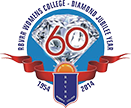Program specific outcomes of B.Sc Mathematics and Statistics
- Distinguish between linear, nonlinear, partial and ordinary differential equations.
- Understand the concept of limit of a function, use it to prove properties of continuous functions and the derivative of a function
- Expound upon the concept of Riemann integrability.
- Demonstrate when a binary algebraic structure forms a group and learn group properties.
- Treat special types of rings such as Euclidean domain and Principal Ideal domain.
- Ability to work within vector spaces and to distill vector space properties
- Ability to compute Eigen values and Eigen vectors.
- Ability to manipulate linear transformations and to distill mapping properties
- Evaluate Line, Surface and Volume Integrals using Divergence, Green’s and Stroke’s Theorems
- Calculate a definite integral using an appropriate numerical method and find roots of functions
- Derive numerical methods for various mathematical operations and tasks, such as interpolation, differentiation, integration.
- Solve linear and nonlinear equations and differential (numerical methods)
- Understand the role of computation as a tool in real world problem solving
- Ability to utilize transform methods (e.g. Laplace and Fourier Transforms) to find solutions of Initial and Boundary Value problems (heat equation and wave equation).
- Understand concept of six-sigma and analyze the control chart, time series and learn methods of demand analysis.
- To use the facility with mathematical and computational modeling of real decision making
- Justify the best random sampling theory from the types of sampling theories.
- Justify the best estimator from criteria of good estimators.
- Identify the discrete and continuous distributions which are Binomial distribution, Poisson distribution along with other distribution functions.
- Use methods of design of experiments, analysis and interpretation of data, and synthesize the information to provide valid conclusions.





